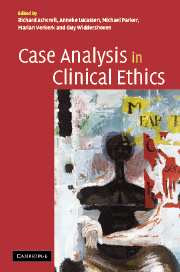Book contents
- Frontmatter
- Contents
- Notes on contributors
- Acknowledgements
- 1 Philosophical introduction: case analysis in clinical ethics
- 2 Families and genetic testing: the case of Jane and Phyllis
- 3 Family access to shared genetic information: an analysis of the narrative
- 4 A virtue-ethics approach
- 5 Interpretation and dialogue in hermeneutic ethics
- 6 ‘Power, corruption and lies’: ethics and power
- 7 Reading the genes
- 8 A utilitarian approach
- 9 A feminist care-ethics approach to genetics
- 10 A conversational approach to the ethics of genetic testing
- 11 Families and genetic testing: the case of Jane and Phyllis from a four-principles perspective
- 12 A phenomenological approach to bioethics
- 13 An empirical approach
- 14 Response to ethical dissections of the case
- 15 Philosophical reflections
- Index
- References
12 - A phenomenological approach to bioethics
Published online by Cambridge University Press: 01 September 2009
- Frontmatter
- Contents
- Notes on contributors
- Acknowledgements
- 1 Philosophical introduction: case analysis in clinical ethics
- 2 Families and genetic testing: the case of Jane and Phyllis
- 3 Family access to shared genetic information: an analysis of the narrative
- 4 A virtue-ethics approach
- 5 Interpretation and dialogue in hermeneutic ethics
- 6 ‘Power, corruption and lies’: ethics and power
- 7 Reading the genes
- 8 A utilitarian approach
- 9 A feminist care-ethics approach to genetics
- 10 A conversational approach to the ethics of genetic testing
- 11 Families and genetic testing: the case of Jane and Phyllis from a four-principles perspective
- 12 A phenomenological approach to bioethics
- 13 An empirical approach
- 14 Response to ethical dissections of the case
- 15 Philosophical reflections
- Index
- References
Summary
Phenomenology is a diverse and complex philosophical movement encompassing a broad range of philosophical concerns that are linked to a common method and orientation (Spiegelberg 1982). The so-called phenomenological method involves a commitment to focus philosophical analysis and discourse on the things themselves, as they are experienced in consciousness. The phenomenological method is applicable to various specialised fields including psychological aspects of consciousness such as perception, memory, imagination or cognition, as well as everyday experience. For present purposes, I shall not discuss the complex theory of consciousness and method that divides the phenomenological movement into different branches (Spiegelberg 1982). Instead, I shall show how the phenomenological method can be useful in analysing the case of Jane and Phyllis described in Chapter 1. In order to do so, I shall discuss three related topics: the phenomenological view of experience and method; the structure of typifications or taken-for-granted background meanings that structure bioethical analysis and discourse; and elements of the case example chosen to illustrate a phenomenological approach.
Experience and method
The locus of our everyday experience is the life world of the natural attitude (Husserl 1967), which involves the taken-for-granted set of meanings that define the common-sense world of everyday life (Schutz and Luckman 1973). The world of the natural attitude is shaped socially.
Experience of the world and its objects is always structured by meanings that are themselves correlated (in intentionality) with acts of consciousness. All experience is permeated with meaning.
- Type
- Chapter
- Information
- Case Analysis in Clinical Ethics , pp. 187 - 200Publisher: Cambridge University PressPrint publication year: 2005



